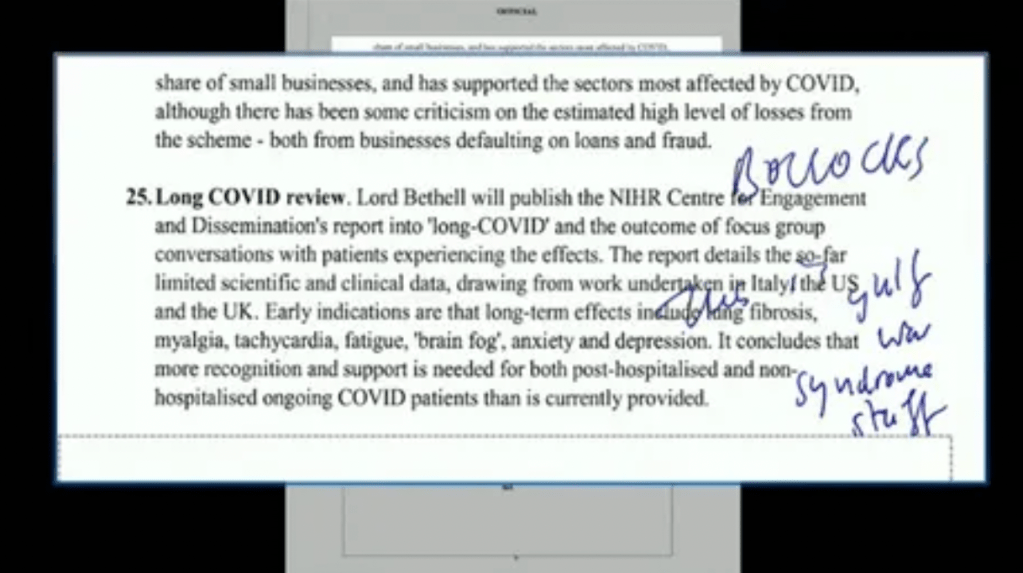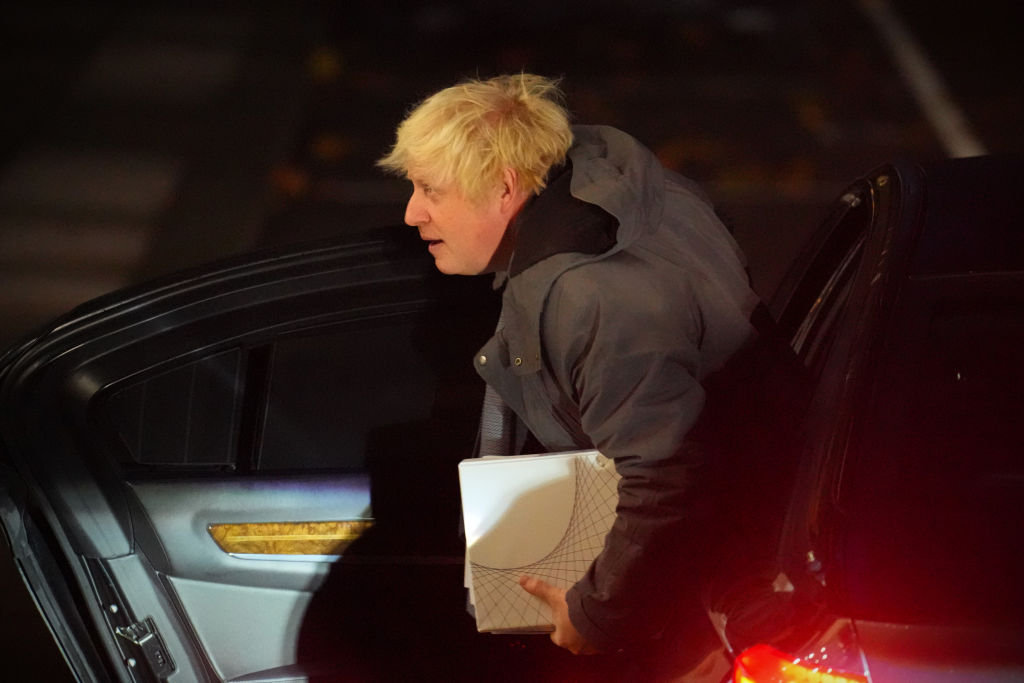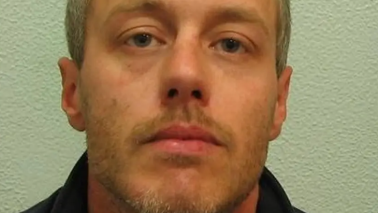Today’s the day. The start of one of the most highly anticipated evidence sessions at the Covid Inquiry sees former Prime Minister Boris Johnson take the hot seat. Here are the key points from his evidence so far:
Baroness Hallett reprimands those leaking Covid evidence
Baroness Hallett told Johnson that his statement is supposed to remain ‘confidential’, wrapping metaphorical knuckles as she continued: ‘Failing to respect confidentiality undermines the inquiry’s ability to do its job fairly, effectively and independently’.
But before today’s hearing could go much further, there was another halt to the proceedings. Just as Johnson launched into his apology, protestors off camera had made their presence known. After repeated warnings from the Baroness, four hecklers were forced out the room. A dramatic start to the day…
Johnson did not read Sage minutes
Ever the man of detail, Johnson has also admitted to the inquiry this morning that he only read minutes of Sage meetings ‘once or twice’ — before adding hurriedly that it was ‘maybe more than that’. Instead, the former PM said, he relied on chief medical officer Sir Chris Whitty and chief scientific adviser Patrick Vallance to distil the Sage findings. This is the same Patrick Vallance who only weeks ago said that Johnson was often ‘bamboozled’ by the science. How interesting to note that it was merely the summarised science that managed to vex Johnson…
Former PM admits he has apologised to recipient of WhatsApp ‘abuse’
A focal point of the inquiry has been the ‘toxic’ workplace culture at the heart of No. 10. Lead counsel Hugo Keith KC notes that while the inquiry is ‘not interested in…Cummings’ linguistic style’ but that the detail of Johnson’s former adviser’s messages paints ‘an appalling picture of incompetence and disarray’. Johnson rebuffs Keith’s conclusions, and instead compares his government to those of Margaret Thatcher and Tony Blair, saying:
Any powerful and effective government has a lot of challenging and competing characters whose views about each other might not be fit to print but who get an awful lot done.
Keith quizzes Johnson on whether these concerns were put to him directly, telling him that there was ‘a WhatsApp that was sent directly to you’ about the ‘toxic reputation’. At first combative, the former PM backs down, saying ‘I’m sorry’ as he is corrected. Johnson does admit, however, that he has apologised to one person who was seen to have ‘suffered abuse’ in public WhatsApp exchanges. (This is later revealed to be former deputy cabinet secretary, Helen MacNamara.)
Johnson defends not chairing Cobra meetings
A rather large point of contention raised as far back as 2020 was Johnson’s peculiar decision not to attend government Cobra meetings. At the start of the pandemic, Michael Gove revealed to Andrew Marr that Boris had in fact missed five consecutive emergency meetings. Today Johnson defended his, er, hands-off approach, saying that he ‘took what Matt had to say very seriously’. Perhaps not seriously enough: he also told the Inquiry today that he cannot remember whether Hancock warned him about Covid in January…
Johnson takes a swipe at Hugo Keith
On the theme of unseriousness, lead counsel Keith decided to pry about Johnson’s whereabouts during the month before the pandemic. Was he at Chevening during this time, Keith enquired to a rather unimpressed interviewee.
‘No one is suggesting you put your feet up at Chevening during that week,’ Keith told him.
‘Apart from you, that is,’ Johnson snapped.
Former PM admits he should have ‘twigged’ about the pandemic by February
Whitehall was more than a little sceptical about the virus, according to Johnson. He admits he himself was rather ‘agnostic’ about the situation and bemoaned the fact that not ‘enough credence’ was attached to forecasted death tolls. Despite saying he was ‘rattled’ by hearing of the dire scenes in Italy, Johnson admitted that ‘we should collectively have twigged much sooner, I should have twigged’.
Johnson accused of focusing more on comms than Covid
A message from Dominic Cummings was shown to the inquiry, reading:
Need briefing on corona [tomorrow]. Chief scientist told me today it’s [probably] out of control now and will sweep world. Will be major comms exercise.
Johnson didn’t offer a particularly convincing rebuttal to the idea that Covid was being treated as a comms exercise. It didn’t exactly help that the first ‘mistake’ Boris admitted to this morning was around public health messaging rather than more serious flaws in decision-making. A later note shown to the inquiry was from the former PM’s private secretary Imran Shafi, recording Johnson’s concerns about a government ‘overreaction’. Was the former PM more interested in public appearances than public health?
Former PM defends not locking down sooner
Johnson’s hesitance over locking Britain down has cropped up a lot at the Inquiry so far. The papers trailed that Johnson would point to warnings he received from scientists over this time about locking down too early. Today, Johnson admitted that this was ‘the prevailing view’ — and both Whitty and Vallance put forward this case.
Would he have introduced measures earlier had he not been told this? It was ‘fundamental’ to his decision-making, he claimed. Talk about passing the buck…
‘I shouldn’t have’ shaken hands with hospital patients
Well, well, well. Today’s hearing presented a changed man from the one who proudly announced he had shaken hands with ‘everybody’ at a hospital ‘where there were actually a few coronavirus patients’ at the start of Covid. Johnson soberly admitted at today’s inquiry that he ‘shouldn’t have done that in retrospect’. You can bet his advisers were wishing he’d understood that at the time… It was a decision that baffled his team, given Johnson had received warnings from scientists that the government should urge the nation to avoid, er, shaking hands. ‘I wanted to be encouraging to people,’ he added, a little feebly.
There was ‘no other tool’ left when deciding to lock down
Blasted by Keith for how the debate on herd immunity ‘trundled on for weeks’, Johnson spoke of a ‘pretty grim press conference’ he held at the start of March when the seriousness of the virus was starting to become clear. But, like the true liberal he is, the former PM admitted that while he had considered the arguments against lockdown and spoken to the chancellor about the downsides, he acquiesced in the end. ‘I had no other tool,’ he told the counsel. ‘Literally nothing else.’
Long Covid scepticism
What did Boris Johnson think of long Covid during the pandemic? Scribbling on the margins of a government note about the condition, Johnson wrote that the illness sounded like ‘bollocks’ and ‘Gulf War Syndrome stuff’. He told the Inquiry today that he regretted the language, saying he meant ‘no disrespect to long Covid patients’ and instead wanted to ‘get to the heart of the matter’. It’s certainly one approach…

Johnson denies he kept Hancock on as the ‘sacrifice of the inquiry’
Oh dear. Matt Hancock’s ears will be burning if he has indeed tuned into Johnson’s hearing today. Keith quizzed the ex-PM on the advice of his former cabinet secretary Mark Sedwill — who suggested Johnson sack Hancock ‘to save lives and protect the NHS’. The ex-PM denied claims that he kept Hancock on as an inquiry ‘sacrifice’ but admitted he did think about firing him. In the end though, he couldn’t be quite sure he’d be ‘trading up’ by replacing him with someone else. Ouch…







Comments